| Listing 1 - 6 of 6 |
Sort by
|
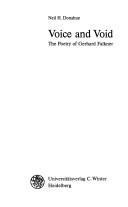
ISBN: 9783825305796 3825305791 Year: 1998 Publisher: Heidelberg: Winter,
Abstract | Keywords | Export | Availability | Bookmark
 Loading...
Loading...Choose an application
- Reference Manager
- EndNote
- RefWorks (Direct export to RefWorks)
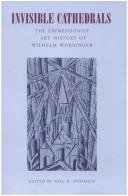
ISBN: 0271013060 Year: 1995 Publisher: University Park (Pa.) : Pennsylvania state university press,
Abstract | Keywords | Export | Availability | Bookmark
 Loading...
Loading...Choose an application
- Reference Manager
- EndNote
- RefWorks (Direct export to RefWorks)
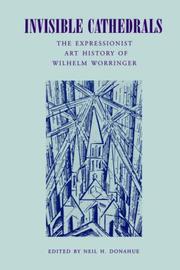
ISBN: 0271030496 Year: 1995 Publisher: University Park Pennsylvania State university press
Abstract | Keywords | Export | Availability | Bookmark
 Loading...
Loading...Choose an application
- Reference Manager
- EndNote
- RefWorks (Direct export to RefWorks)
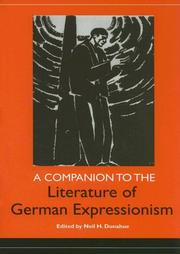
ISBN: 1571131752 9781571131751 9781571136565 9786611801045 1281801046 1571136568 Year: 2005 Volume: *36
Abstract | Keywords | Export | Availability | Bookmark
 Loading...
Loading...Choose an application
- Reference Manager
- EndNote
- RefWorks (Direct export to RefWorks)
More than any other avant-garde movement, German Expressionism captures the aesthetic revolution of 20th-century modernity in all its contrasts and conflicts. In continuous eruptions from 1905 to 1925, Expressionism upset reigning practices in the arts, most vividly in painting and the visual arts. In the literature, a heady intellectualism combined with dramatic gesture, graphic visions, exuberant emotions and urgent proclamations to forge forceful styles of verbal expression. Expressionism introduced into art both visual and verbal a shockingly new intensity with many facets and many faces.This volume presents the literature of German Expressionism, which is far less known in the English-speaking world, with essays by leading scholars on Expressionism's philosophical origins, its thematic preoccupations, and its divergent stylistic manifestations by writers whose common bond is intensity and whose lines on the page read like the gouges of a woodcut: Georg Kaiser, Walter Hasenclever,and Ernst Toller in drama; Gottfried Benn, Georg Heym, Else Lasker-Schüler, and Georg Trakl in poetry; Alfred Döblin, Carl Einstein, and Carl Sternheim in prose, to name just a few. Against the background of the journals, exhibitions, and anthologies, the café meeting places and public life of Expressionism, the volume's highly focused, intrinsic analyses of texts and comprehensive overviews of extrinsic contexts (and of the most up-to-date research) shows the fervor and complexity of the period and its effulgent literary formations.
Neil H. Donahue is Professor of German and Comparative Literature at Hofstra University.
Expressionism --- Expressionisme --- Expressionnisme --- German literature --- History and criticism --- Aesthetics --- 20th century --- Expressionism. --- History and criticism. --- 20th-century modernity. --- German Expressionism. --- art. --- avant-garde movement. --- complexity. --- dramatic gesture. --- exuberant emotions. --- fervor. --- graphic visions. --- intellectualism. --- literary formations. --- literature. --- painting.
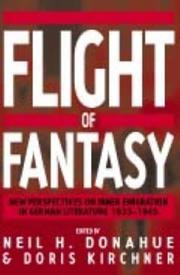
ISBN: 1571810013 1782389652 1571810021 Year: 2003 Publisher: New York : Berghahn Books,
Abstract | Keywords | Export | Availability | Bookmark
 Loading...
Loading...Choose an application
- Reference Manager
- EndNote
- RefWorks (Direct export to RefWorks)
During the Nazi era many German writers chose, or were forced into, exile. Many others stayed and, after the end of this period, claimed to have retreated into "Inner Emigration". The nature of this kind of emigration and the underlying motives of these writers have been hotly debated to this day. Though the reception of Inner Emigration has often been confounded by disputes over the term itself, the issue is ultimately not a matter of nomenclature, but of more far-reaching issues of literary evaluation, moral discernment and the writing of history. This volume presents, for the first time, to an English-speaking readership the complexity of Inner Emigration through the analysis of problematic individual cases of writers who, under constant pressure from a watchful dictatorship to conform and to collaborate, were caught between conscience and compromise.
German literature --- Authors, German --- National socialism and literature --- History and criticism --- Political and social views --- Germany --- Politics and government
Book

ISBN: 9781782389651 Year: 2003 Publisher: New York Oxford
Abstract | Keywords | Export | Availability | Bookmark
 Loading...
Loading...Choose an application
- Reference Manager
- EndNote
- RefWorks (Direct export to RefWorks)
| Listing 1 - 6 of 6 |
Sort by
|

 Search
Search Feedback
Feedback About UniCat
About UniCat  Help
Help News
News